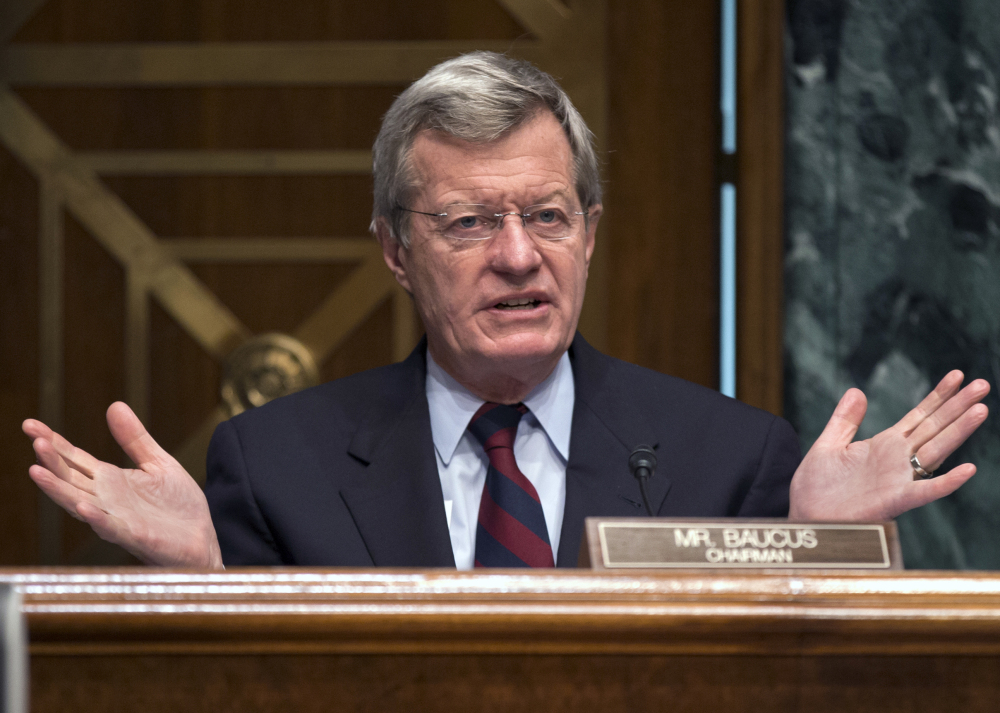WASHINGTON — President Barack Obama is looking to the Senate again to fill a top diplomatic post, with Democratic officials saying he intends to nominate six-term Sen. Max Baucus of Montana to be the next U.S. ambassador to China.
Baucus, who announced earlier this year that he would not seek re-election, is knowledgeable on trade issues as chairman of the Senate Finance Committee but better known for his work on that panel steering Obama’s health care overhaul into law three years ago.
If confirmed by the Senate, Baucus would replace Ambassador Gary Locke, who plans to step down next year. The White House could make a formal announcement about the selection of Baucus as early as Thursday.
Nearly a year ago, Obama reached into the Senate ranks when he nominated then-Sen. John Kerry to serve as secretary of state. The Massachusetts Democrat had a smooth path to confirmation, and Baucus, as a member of the Senate club, is likely to easily secure approval from his colleagues.
Baucus’ departure from the Senate would have an immediate impact on one of Congress’ most powerful committees and on the 2014 election for control of Congress. Under Montana state law, Democratic Gov. Steve Bullock has the authority to name a Senate successor to serve until the election, and speculation immediately turned to a fellow Democrat, Lt. Gov. John Walsh, already running for Senate.
Baucus, 72, sidestepped questions about the ambassadorship when asked in the Capitol. “It’s not for me to comment on. … This happens every once in a while. Names get floated around.”
The White House had no immediate comment on the disclosure, which was made by officials who spoke on condition of anonymity because they were not authorized to discuss the nomination publicly before a formal announcement.
Kathy Weber, a spokeswoman in Baucus’ office, declined to confirm the move but said, “Max has given his life to public service and when asked to serve he takes that request very seriously.”
Obama is in search of a new top diplomat in Beijing as he executes a so-called Asia pivot in U.S. military strategy to more directly counter China after the wars in Iraq and Afghanistan.
The relationship between the two nations has grown more troubled in recent weeks, with Chinese authorities unilaterally declaring an air defense zone over disputed islands in the East China Sea. The United States subsequently flew a pair of B-52 bombers through the space last month without incident, and Vice President Joe Biden sought to calm matters on his recent trip through Asia.
Baucus was first elected to the Senate in 1978 and since early 2007 has been chairman of the Finance Committee, which has jurisdiction over taxes, trade, health care and more. He has traveled to China more than a half dozen times.
On some key issues, he has pursued a more moderate approach than some fellow Democrats would prefer, a reminder that he hails from a rural, Western state with a history of electing Republicans as well as Democrats to top political offices.
Shortly after becoming chairman, he led the opposition to then-President George W. Bush’s proposal to privatize Social Security.
Two years later, with Obama in the White House, he struggled for months to assemble bipartisan backing for health care legislation in 2009 to the growing impatience of fellow Democrats. He managed to gain one Republican vote for legislation that cleared committee, but the final bill was thoroughly partisan.
As committee chairman, Baucus has pressed both Democratic and Republican administrations to take a harder line against what he says are unfair Chinese trade practices. The country has the largest trade surplus of any nation with the U.S., and American manufacturers claim it is manipulating its currency to maintain that imbalance.
Inside the Senate, Baucus’ appointment would create a vacancy atop the panel that Senate Democrats would fill. Sen. Jay Rockefeller of West Virginia is immediately behind Baucus in seniority and ordinarily would ascend to the chairmanship but has announced he intends to retire at the end of next year. Sen. Ron Wyden of Oregon is next in line in seniority.
In comments to reporters, Rockefeller indicated he would not seek to claim the spot, saying it would be good if Wyden succeeded Baucus. “I want that committee to be a little more aggressive, and he will be,” he said.
Wyden is chairman of the Energy Committee and would likely be replaced there by an oil state Democrat, Sen. Mary Landrieu of Louisiana.
With Democrats struggling to retain their majority in the 2014 elections, Baucus’ announced retirement had turned the state into a challenging one for the party. Obama lost the state in 2012 to Republican Mitt Romney by 13 points.
First-term Republican Rep. Steve Daines has announced his candidacy for the seat.
Send questions/comments to the editors.



Success. Please wait for the page to reload. If the page does not reload within 5 seconds, please refresh the page.
Enter your email and password to access comments.
Hi, to comment on stories you must . This profile is in addition to your subscription and website login.
Already have a commenting profile? .
Invalid username/password.
Please check your email to confirm and complete your registration.
Only subscribers are eligible to post comments. Please subscribe or login first for digital access. Here’s why.
Use the form below to reset your password. When you've submitted your account email, we will send an email with a reset code.